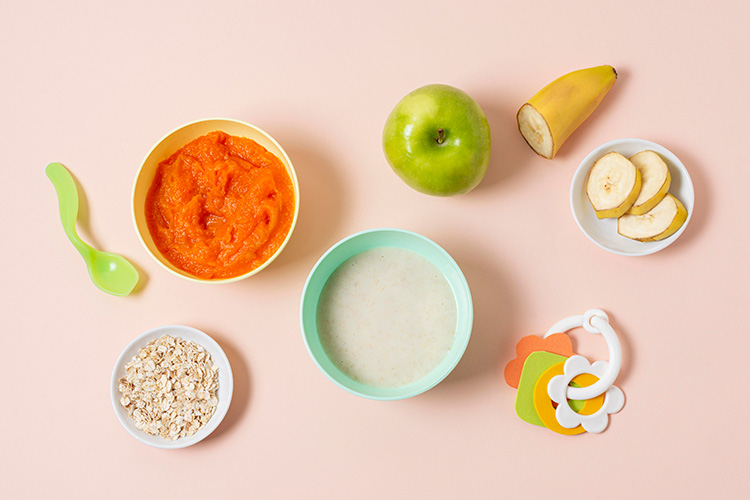
New parents always have a lot on their minds, including providing their babies with the best diet possible. As soon as you know what nutrients babies need, it’s fairly easy to provide them.
Breast milk and/or formula provide all the nutrients babies need to thrive during their first six months. It’s a huge relief to know that, at least when it comes to feeding your baby, you’re pretty much covered during those early days. That’s exactly why switching to solids can be so challenging. During the first 12 months, breast milk and/or baby formulas will be the main sources of your child’s nutrition, but solid foods will gradually introduce more nutrients.
What amount of food should babies eat?
There are some babies who enjoy eating a variety of foods while there are some who do not like to eat anything at all.
Most healthy babies eat enough to grow and thrive when offered a wide variety of wholesome foods and allowed to follow their appetites. It’s likely that your child is getting all the nutrition she/he needs if she/he is growing at a healthy rate along her growth curve. If she/he is not, your doctor will let you know.
Introducing new foods to your baby should not be rushed, measured, or counted; instead, aim for a mix of foods that are good for the baby.
What nutrients are most important in a baby’s diet?
In your baby’s diet, there are no “unimportant” nutrients – but some play a bigger role than others. The following nutrients are essential for your baby’s growth (Be careful not to introduce too many new foods at once to your baby, and watch for signs of an allergic reaction when they first try common allergens like nuts, dairy, and wheat.)
- Protein – Breast milk and/or formula still provide most of the protein baby needs. Having said that, since that picture may change once your little one turns one, now’s a great time for your little one to start trying other protein-packed foods such as eggs, meat, chicken, fish, and tofu. Protein is also found in calcium-rich foods (such as cottage cheese and ricotta), as well as in some grains.
- Calcium – For the first year of your baby’s life, both breast milk and baby formula are a great sources of calcium. There are a lot of tasty, nutritious foods that are baby-friendly, including whole milk cheeses (like cheddar, muenster, Havarti, baby Swiss, Colby, or Monterey Jack) as well as whole milk yogurt, ricotta, and cottage cheese.
- Complex carbohydrates and whole grains – Whole-grain bread, whole-grain cereals (baby cereals for spoon-feeding; bite-size cereals for self-feeding), brown rice, quinoa, lentils, beans, and peas are all good options.
- Vitamins (A,B,C,E) – These four vitamins promote the healthy development of your baby’s brain and nervous system, as well as proper function and development of the eyes, skin, and immune system. A rich source of vitamin A is carrots and sweet potatoes, while B vitamins are found in green veggies, bananas, and beans; C vitamins are found in tomatoes, strawberries, and cantaloupe; and E vitamins are found in cereals and grains.
- High-fat foods – Those who receive most of their calories from breast milk and/or baby formula get all the fat and cholesterol they need. It’s important to ensure that fat and cholesterol intake does not drop too low as they switch to a more varied diet and spend less time breastfeeding or bottle-feeding. Therefore, most dairy products you feed your baby (cottage cheese, yogurt, hard cheese) should be full-fat or made from whole milk.
- Iron – Unlike breastfed babies, bottle-fed babies get their full share of iron from fortified formula. Until you start adding iron-rich solids to your baby’s diet, ask your pediatrician if you should give her/him a liquid iron supplement. As a baby’s diet is expanded, iron-rich foods can be introduced, such as meat, egg yolks, wheat germ, whole grain bread, cereals, and cooked dried peas.
- Omega 3 fatty acids – Omega-3 fatty acids (including DHA) are essential for your infant’s growth, vision, and optimal brain development – more than living up to their reputation as baby brain food. Besides being naturally present in breast milk, these fabulous fats can also be found in baby formulas like Kendamil Classic Stage 1. As your baby’s diet expands, you can include fish (such as salmon), grass-fed meat, tofu, flaxseeds, canola oil, and DHA-enriched yogurt, cereal, and eggs.
- Fluids – The majority of a baby’s fluids come from the bottle or breast during the first six months of life – supplementary water is usually not needed. Around 6 months, sips of water with meals and juicy fruits and vegetables will begin to provide small amounts of nutrition. The total fluid intake should not decrease as formula or breast milk consumption decreases.
You don’t need to worry about serving sizes or quantities. Instead, provide a variety of healthy baby foods in a fun, relaxed setting. As healthy eating habits take shape, you can sit back and watch the whole process unfold.
Final thoughts
Your child is probably getting enough food if she/he is growing at a healthy rate – that is along her/his own growth curve, which your pediatrician will measure with a growth chart. Talk to your child’s pediatrician if you suspect your baby isn’t eating enough. The pediatrician can evaluate your little one further or refer you to a nutritionist.
related post

Leave a Reply